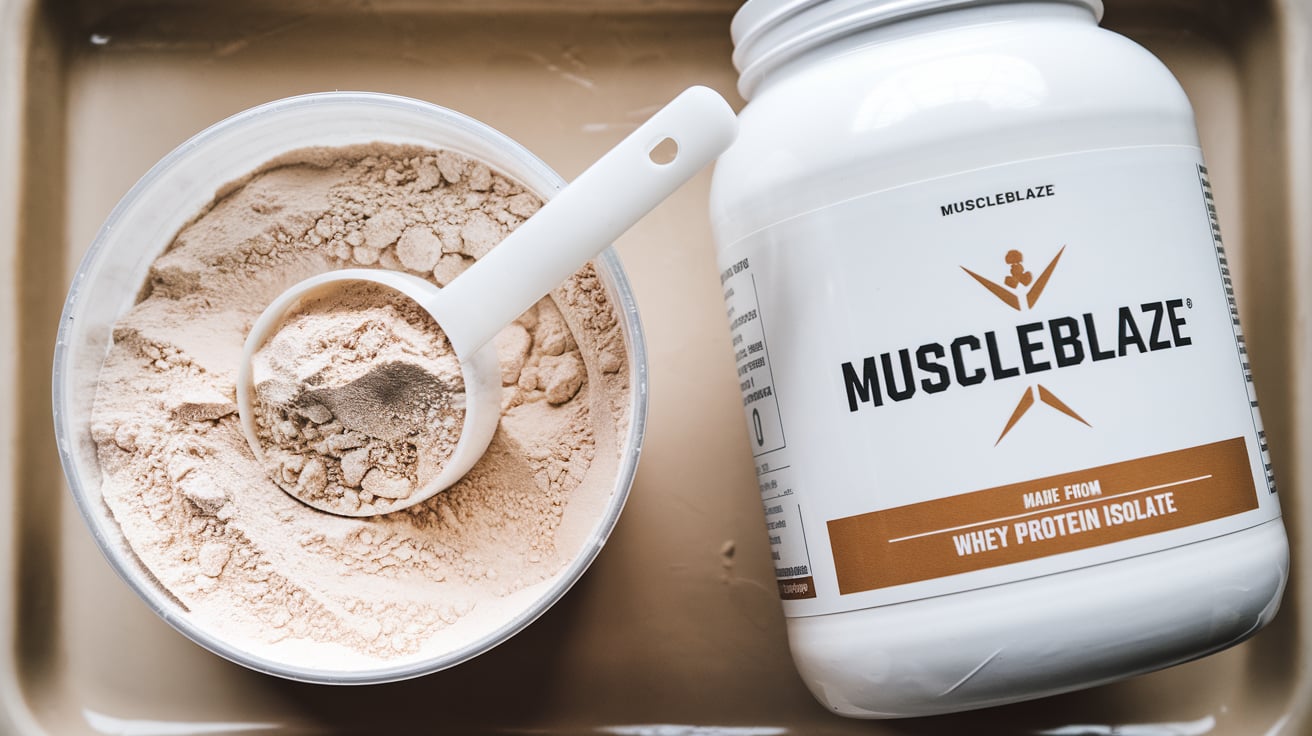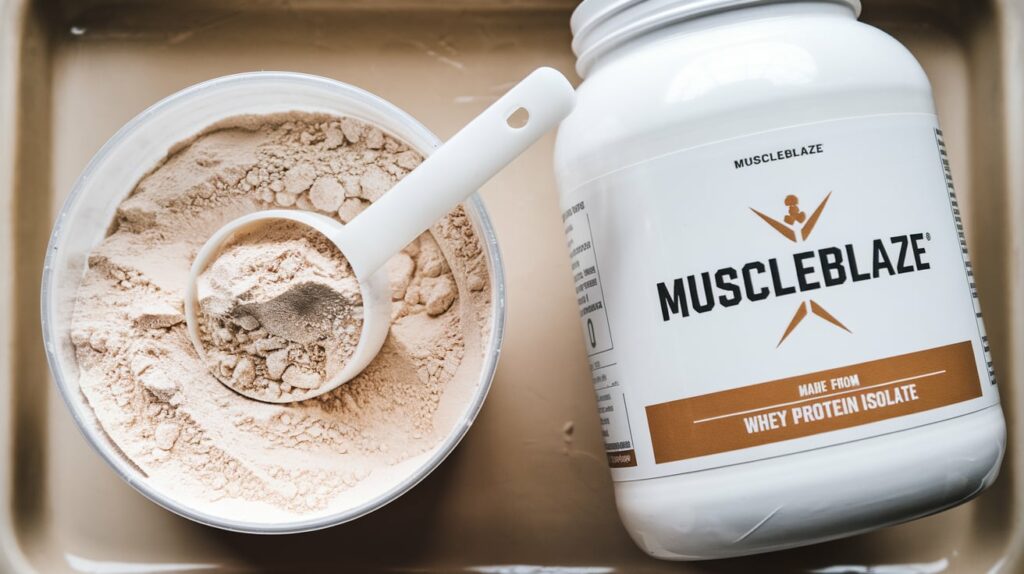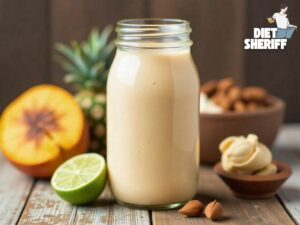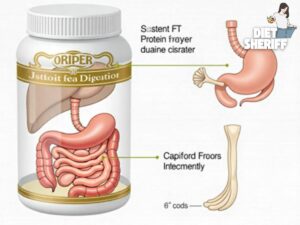Are you a fitness enthusiast who’s enthusiastic about protein powder, but worried about the, ahem, gassy side effects? You’re not alone! Many people who consume protein powder experience bloating, discomfort, and yes, farting.
But why does protein powder make you fart? Is it because of the protein itself, or is there something else at play?
This comprehensive guide will answer all your questions about the gassy side effects of protein powder. We’ll uncover the culprits behind those embarrassing moments and explore ways to minimize the discomfort. Let’s dive right in!

The Science Behind Protein Powder-Induced Flatulence
You may be wondering, what causes protein powder to potentially increase flatulence. The primary reason protein powder can cause gas is the presence of lactose. Whey protein, a common type, is derived from milk and contains lactose, a sugar that many people have trouble digesting.
Related Article: Can You Put Protein Powder in Milk? The Ultimate Guide
Lactose intolerance is a condition where the body lacks the enzyme lactase, which is needed to break down lactose. When lactose isn’t properly digested, it ferments in the gut, producing gas and bloating.
But lactose isn’t the only culprit. Other ingredients in protein powder can also contribute to gas, such as:
- Fiber: While fiber is essential for gut health, too much of it can lead to gas and bloating. Some protein powders are fortified with fiber to enhance their nutritional profile.
- Artificial sweeteners: Certain artificial sweeteners like sucralose and aspartame can also cause digestive discomfort, including gas.
- Undigested protein: If your body doesn’t break down protein efficiently, it can ferment in your gut, leading to gas.
https://gigasecurehome.com/who-makes-ring-cameras
Why Do Some Individuals Experience More Gas After Consuming Protein Powder?
There are a few key reasons why some people may be more prone to experiencing gassy side effects from protein powder:
Related Article: What to Do with Expired Protein Powder? The Ultimate Guide
1. Lactose Intolerance
Many protein powders are dairy-based, containing whey or casein proteins. For individuals who are lactose intolerant, the lactose in these powders can be difficult to digest, leading to increased gas production.
2. Sensitivity to Certain Protein Types
Some people may have a sensitivity or intolerance to specific types of proteins, such as those found in certain plant-based powders. This can cause digestive distress, including excessive flatulence.
3. Artificial Sweeteners and Additives
Many protein powders contain artificial sweeteners like sucralose or additives like gums and thickeners to improve texture and flavor. While these ingredients may make your protein shake taste delightful, they can also contribute to gas and bloating.
4. Inadequate Hydration
Protein powder is, well, powdery, and it needs plenty of liquid to help it move through your digestive system smoothly. If you’re not drinking enough water when consuming protein powder, it can clump up and become harder to digest, which can lead to gas and bloating.
5. Individual Gut Microbiome
The unique makeup of an individual’s gut microbiome, the community of microorganisms living in the digestive tract, can play a role in how well they tolerate and digest protein powders. Those with an imbalance or lack of certain gut bacteria may struggle more with the gassy side effects.
Related Article: Does Protein Powder Have Calories?
6. Dosage and Timing
The amount of protein powder consumed and when it’s taken can also impact gas production. Larger servings or consuming the powder on an empty stomach may overwhelm the digestive system more, leading to increased flatulence.
https://gigasecurehome.com/blink-camera-not-recording-without-subscription
The Potential Dangers of Excessive Flatulence
While passing gas is a natural and normal bodily function, excessive flatulence can be both uncomfortable and embarrassing. In some cases, it may even be a sign of a more serious underlying condition.
Prolonged, excessive gas may be a symptom of:
- Irritable Bowel Syndrome (IBS): A chronic condition that can cause digestive problems, including excessive gas and bloating.
- Small Intestinal Bacterial Overgrowth (SIBO): An imbalance of bacteria in the small intestine that can lead to digestive issues like gas and bloating.
- Lactose Intolerance: An inability to properly digest the lactose found in dairy products, leading to gas, bloating, and diarrhea.
In rare cases, excessive flatulence can also be a sign of a more serious condition, such as Crohn’s disease or celiac disease. If the problem persists or worsens, it’s always a good idea to consult with a healthcare professional.
https://gigasecurehome.com/blink-camera-flashing-red-6-times
What Protein Sources Are Least Likely to Cause Gas?
If you find yourself repeatedly falling victim to noxious protein-induced gas attacks, switching to certain protein sources might help cut the farts. Here are some of the more digestible options:
Related Article: How Long Can Protein Powder Last? The Ultimate Guide
Egg Protein Powder
Derived from egg whites, egg protein is free of lactose and many find it easier on their stomachs compared to milk proteins. The downside is it’s lower in certain amino acids so it doesn’t have a complete protein profile.
Pea Protein Powder
As one of the more hypoallergenic plant-based proteins around, pea protein tends to cause less digestive distress for most people. It’s dairy-free, lactose-free and vegan-friendly.
Brown Rice Protein Powder
Another dairy-free, plant-based winner, brown rice protein is easy to digest and low in fiber which helps minimize gas and bloating.
Hydrolyzed Protein Powders
Hydrolyzed proteins like whey protein isolates have already gone through partial predigestion, breaking down the big protein molecules into smaller pieces called peptides. This makes them easier for your body to fully digest.
How to Minimize Protein Powder Farts?
Don’t let the fear of gas deter you from enjoying the benefits of protein powder. There are ways to minimize the gassy side effects:
- Choose lactose-free protein powder: Opt for whey protein isolate or hydrolyzed whey protein, which are typically lactose-free.
- Start with smaller portions: If you’re new to protein powder, start with a small amount and gradually increase your intake.
- Mix your protein powder with water: Mixing it with milk can exacerbate lactose intolerance.
- Consider taking a digestive enzyme supplement: Lactase supplements can help break down lactose, reducing gas and bloating.
- Eat protein powder with a meal: This can help slow down digestion and reduce the likelihood of gas.
- Choose protein powders with minimal added ingredients: Look for protein powders with fewer additives, such as artificial sweeteners and fiber.
- Pay attention to your body: If you experience excessive gas or other digestive issues, stop using the protein powder and consult with a healthcare professional.
I hope this article has helped you acknowledging the possible reasons why does protein powder make you fart. Dealing with protein powder-induced flatulence can be a frustrating experience. But with a little bit of trial and error, you can find the right strategies to make your protein shakes a gas-free delight.
Remember, everyone’s digestive system is unique. What works for one person may not work for another. If you’re concerned about gas or other digestive issues, don’t hesitate to consult with a healthcare professional.
And hey, if you do let one rip after a protein shake, don’t be embarrassed! We’ve all been there. Just remember to blame the protein powder, not yourself diet sheriff.
Explore Also:
Creativehouseblog
Gigasecurehome
Mycleanseplan
Why Does Protein Powder Make You Fart – FAQs
Why does protein powder cause gas and bloating?
Protein powder can cause gas and bloating due to the way the body digests and breaks down the concentrated protein. The bacteria in your gut can ferment the undigested protein, leading to excess gas production and flatulence.
Can drinking too much protein powder lead to excessive farting?
Yes, consuming large amounts of protein at once, such as through massive protein shakes, can overwhelm your digestive system and lead to increased gas production.
Is it better to choose whey or plant-based protein powder for reducing gas?
For individuals who are lactose intolerant or sensitive to dairy, plant-based protein powders like pea, soy, or brown rice may be better tolerated and less likely to cause gas and bloating.
Should I stop taking protein powder if it consistently causes me gas?
If you’ve tried various strategies and still experience excessive gas and discomfort from protein powder, it may be wise to consult a healthcare professional or consider alternatives to meet your protein needs.
Is it possible to eliminate gassiness from protein powder completely?
While it’s challenging to completely eliminate gassiness from protein powder, choosing a suitable protein powder, taking steps to minimize the gassy effects, and maintaining a healthy gut microbiome can help reduce the symptoms significantly.






